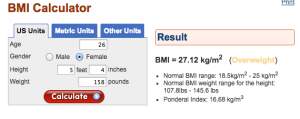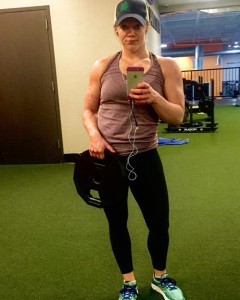Weh-heh-heh-hehlllll…. this post has been a long time coming. This particular issue has loooong been one that I’ve had strong feelings about, but recent developments have really begun to grind my gears. Maybe it’s because I’ve changed my fitness routine that I’m facing it more head-on, but damn if I’m not righteously pissed at what that crappy height-weight ratio has done to my brain.
Some background:
The body mass index scale (BMI) was established in the early nineteenth century – so, you know, it’s vintage – by a guy named Adolphe Quetelet who was working on what he called “social physics” and the BMI was meant to measure obesity rates in populations. Seems simple enough, but therein lies the problem.
This crude scale, which calculates your BMI indicator by diving your weight (in kg) by your height (in m), really only measures tissue mass as a whole and doesn’t take into consideration your body composition at all. So, when calculating your BMI, it doesn’t matter if you carry more belly fat or are a body builder – the numbers on the scale are the only ones that matter.
Though science has advanced significantly since 1830, this calculation, unfortunately, has not. In 1973, scientist Ancel Keys said of the BMI calculation: “…if not fully satisfactory, [it is] at least as good as any other relative weight index as an indicator of relative obesity.”
Um. WAT.
That’s basically saying “this calculation we’ve been using for more than 100 years is pretty bad, and even though we have new math and new science things that would probably be more accurate, it’s fine.”
And thus we see how society has adopted BMI as the accepted, “easy” indicator for who is overweight and what a “normal” body type looks like.
Numbers. We’ve been conditioned to respond to numbers with a positive or negative reaction regardless of the type of work we’re putting in at the gym or how our body is built. 
That’s total crap if you ask me. And I say that as someone who is just as susceptible to those reactions as anyone else: according to that scale, I’m overweight.
Fortunately, I’m not the only one who thinks the scale is a loser. Recently, Hellogiggles published an article discussing a recent study that debunks the BMI scale as a measure of health. It’s a good read and definitely preaches to the choir – as an athlete, I’ve long felt misrepresented by the scale.
From the time I was 3, I’ve been involved in some sort of athletic activity. I played basketball from the time I was 6 through college. I was a double varsity athlete in high school and was voted “Most Likely to be on the Cover of Sports Illustrated” my senior year. I skied, snowboarded, ran, and hiked every year of my childhood. As an adult, I’ve continued playing the sports I love and began running and lifting weights. I love being active and I know I’m a pretty healthy individual.
For equally as long, I’ve been able to find things about my body I didn’t like. Or a thing, rather. No matter how active I’ve been, I’ve always – always – had a little belly. My teammates all had nice flat tummies and I was over here with my belly pudge. I also always weighed just a little bit more than my friends. Not a lot. But enough that I never really liked to bring it up. But I actually didn’t think too much about it because I was so athletic, and I would say that growing up, I had a very healthy relationship with food and body image.
As an adult, however, I’ve encountered instances where the numbers on the scale have predetermined something about me to someone else, and that’s really not a good feeling.
If you’ve read any of my previous posts, you know that in the last 6 months or so, I’ve really taken to lifting weights in favor of running or cycling. I’ve built a ton of muscle and I’m so proud of the strides I’ve made. The gainz have been in my favor.
But, gainz in the gym also mean gains on the scale. Muscle is more dense that fat – a fact many of us are familiar with. More muscle therefore equals more weight. Not a bad thing, right? If one’s goal is to build muscle and strength, you want this result. I want this result.
Unfortunately, because society has warped my brain, I still have a hard time with this paradox. Stepping on the scale at my doctor’s appointment last week and seeing “158” blink at me from the display, I felt… disappointed. Like all the work I’ve been doing in the gym wasn’t helping. Like all of that 158 pounds was sitting right around my tummy and everyone could see my gross muffin top.
I texted my lifting partner (who is also my boyfriend) and whined. His response was perfect: “Muscle mass. You squat 185 pounds for reps. That happens. Ignore the number.”
After some more whining from me and some more rational words from him, I felt better. He was right. That number is just a number. It doesn’t say anything except how much gravity is affecting my body mass, and that’s a pretty empty statistic.
I still have my hang ups, but I’m working really hard to focus on making progress in the gym and reaching my fitness goals – which have nothing to do with the number on the scale or what the BMI says that I am and everything to do with feeling good about what my body is capable of accomplishing.




